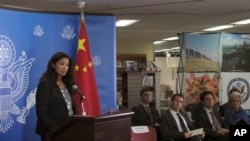“On [July 30-31, 2013], we participated in the 18th . . . U.S.-China Human Rights Dialogue hosted by China’s Ministry of Foreign Affairs in Kunming,” U.S. Acting Assistant Secretary of State for Democracy, Human Rights, and Labor Uzra Zeya said recently in Washington DC.
“This round of the human rights dialogue . . . affirmed a commitment to frank and results-oriented dialogue . . . [and] provided both the United States and China an excellent opportunity to discuss in greater depth the full range of human rights concerns raised at the [most recent U.S.- China] Strategic and Economic Dialogue in Washington DC.”
“We recognized the Chinese people’s remarkable record of economic development over the last three decades and their lifting of hundreds of millions out of poverty,” Ms. Zeya said. “We did not shy away from raising the full range of issues where China’s policies and human rights practices have fallen seriously short of international standards.”
The United States highlighted various ways in which Chinese citizens are speaking out about their expectations of their government on corruption, environmental degradation, worker and consumer safety, rule of law, religious freedom, and other aspects of government policy.
“We discussed both positive steps and setbacks in legal reforms in China,” Ms. Zeya said. “We also underscored U.S. concern over China’s severe restrictions on religious freedom and the freedoms of expression, assembly and association, both offline and online.”
“We specifically called into question the pattern of arrests and extralegal detentions of public interest lawyers, Internet activists, journalists, religious leaders, and others who challenge official policies and actions in China,” She continued. “We also conveyed our deep concern about attempts to control or silence activists by targeting family members and associates of those activists.”
The United States emphasized the role that the rule of law, an independent judiciary, the free flow of information, and a robust civil society can play in helping countries deal with challenges as diverse as environmental degradation, food safety, and corruption.
“I reaffirmed the centrality of human rights to our bilateral engagement,” Acting Assistant Secretary Zeya said. “The Chinese people deserve to be treated with dignity, to have accountable government, and to have their voices heard.”
“This round of the human rights dialogue . . . affirmed a commitment to frank and results-oriented dialogue . . . [and] provided both the United States and China an excellent opportunity to discuss in greater depth the full range of human rights concerns raised at the [most recent U.S.- China] Strategic and Economic Dialogue in Washington DC.”
“We recognized the Chinese people’s remarkable record of economic development over the last three decades and their lifting of hundreds of millions out of poverty,” Ms. Zeya said. “We did not shy away from raising the full range of issues where China’s policies and human rights practices have fallen seriously short of international standards.”
The United States highlighted various ways in which Chinese citizens are speaking out about their expectations of their government on corruption, environmental degradation, worker and consumer safety, rule of law, religious freedom, and other aspects of government policy.
“We discussed both positive steps and setbacks in legal reforms in China,” Ms. Zeya said. “We also underscored U.S. concern over China’s severe restrictions on religious freedom and the freedoms of expression, assembly and association, both offline and online.”
“We specifically called into question the pattern of arrests and extralegal detentions of public interest lawyers, Internet activists, journalists, religious leaders, and others who challenge official policies and actions in China,” She continued. “We also conveyed our deep concern about attempts to control or silence activists by targeting family members and associates of those activists.”
The United States emphasized the role that the rule of law, an independent judiciary, the free flow of information, and a robust civil society can play in helping countries deal with challenges as diverse as environmental degradation, food safety, and corruption.
“I reaffirmed the centrality of human rights to our bilateral engagement,” Acting Assistant Secretary Zeya said. “The Chinese people deserve to be treated with dignity, to have accountable government, and to have their voices heard.”






